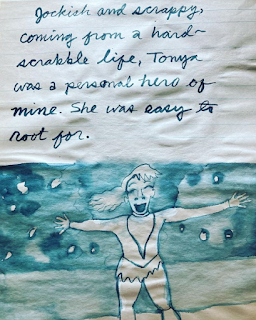Mannie Murphy’s impassioned tour through the seedier and racist aspects of their place of birth Portland in I Never Promised You A Rose Garden grew to grow to be regarded as one of my well-liked books. Definitely, that e-book had its origins as minicomics first, and they’ve released a sixth chapter as a apply-up: The Tonya Challenge. In the a similar vogue as of their e-book, Murphy’s watercolor formula is supplied here in grayscale, and the lined paper they drew on affords this the feeling of a excessive college student goofing off from their true assignment in describe to jot down about the issues that mattered. The say indulges in Murphy’s childhood obsession with disgraced identify skater (and Portland native) Tonya Harding, a identify that within the early 90s drew an astounding media frenzy after her skating rival Nancy Kerrigan became injured in an assault staged by Harding’s abusive boyfriend. On the opposite hand, no topic how avid a fan she became, Murphy’s obvious-headed and even judgment regarding the facts of the topic are what add even better depth to the account.

The account is so acquainted that Murphy doesn’t even bother introducing Kerrigan with her full title, regarding her merely as “Nancy.” Esteem the numerous stories Murphy tells in this fable, or no longer it’s one with a astronomical deal of private that manner to them. Murphy finds their obsession with identify skating as a tiny one, and the game became by no manner extra dramatic (no longer extra beset by racism and classism) than it became then. Murphy recalls looking to gain Harding’s autograph at an art work narrate featuring portraits of her, handiest to be denied. Murphy called it a tragic fall from grace from a identify who in some methods, by no manner in fact had a gamble. Much of this sequence is ready detailing the cultural touchstones and figures that Portland got to name its salvage, and Murphy’s reference to the Portland Move Blazers NBA crew makes me wish they’d tackle that topic subsequent.
Published by the dazzling Entropy Editions, Dean Sudarsky’s 65 Bugs is paying homage to early Michael DeForge comics. That is a series of titled comic strips, most of which might perchance well be three panels, following the lives of anthropomorphic insects. The contrivance Sudarsky attracts their our bodies with human anatomy twisted into insectoid poses (most an linked to a praying mantis or cricket) is in actuality unnerving, and his treating their speech entirely within the context of what the insects would in fact safe is a stroke of genius. My well-liked strip became “Crab,” where we peek an anthropomorphic crab (complete with oversized palms in its place of claws) amused by a shrimp insect unless a fowl picks it up and carries it off, with the crab helplessly yelling “Face me!” to its avian captor. The strips are about mating, looking to lead clear of mating or livid by mating, devouring, being devoured, and even looking to search out out just a few moments of peace. Sudarsky’s line is shimmering and peaceable as he in moderation renders every identify with astronomical readability, emphasizing the expressive nature of every insect’s faces besides to their twisted physique language.

